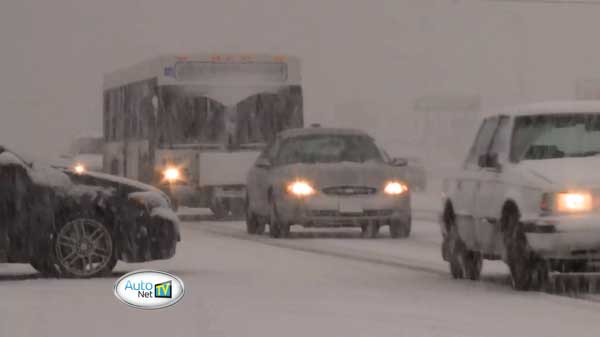Weather Station on Wheels (Vehicle Sensor Maintenance)
February 7, 2021
You probably never thought about it, but your vehicle is like a rolling weather station. It can check the outside temperature, let you know when the roads are slippery and help you deal with rain. And how it does all those things is pretty cool.
First, just like any weather station, a vehicle has sensors that measure the driving and weather conditions you find yourself in. Some of those sensors can control computerized systems in your vehicle to react to the weather. It depends on whether you have a 2-wheel, 4-wheel or all-wheel drive vehicle how those sensors will respond.
Let's start with temperature. Most vehicles now have a thermometer that measures the temperature outside. It's usually in the front, and likely will tell you on the instrument panel what the outside temperature measures. But a temperature sensor will also tell your vehicle's computers to turn on or off certain systems like the heating or air conditioning. If your ambient temperature sensor isn't working right, some symptoms are a malfunctioning automatic A/C or a temperature display that is way different than the app on your phone says it should be.
Your vehicle will also have sensors that measure your speed at each wheel. They work with an onboard computer to measure slippage in any of the wheels so traction control and antilock brakes work correctly in case of slick roads.
Your vehicle can measure something called longitudinal and latitudinal acceleration, and it uses a yaw sensor to do it. That helps it determine if you might be in an oversteering or understeering situation. It's important because it works with your vehicle's brakes to apply stopping power to keep you in control.
A steering wheel sensor tells the vehicle's computers what the driver is doing with the wheel. It also can work with those wheel sensors to measure how slippery the roads are, whether it be due to a wet (rain) or granular (gravel or sand) surface. By sending different torque or braking to each wheel, it helps the driver maintain control.
More and more vehicles now have a rain sensor that can turn on the wipers automatically when they measure precipitation on the windshield.
So, you're driving your own weather station, and making sure all this data is coming in properly depends on how each component is working. Regular service and maintenance on these systems is important to make sure they can do their job. Your rolling weather station can't predict the weather, but it can sure help you deal with it, so help it do its job right.
TLC Custom Exhaust Brakes & Tires
1735 N Main St
Royal Oak, Michigan 48067
248-541-8300
http://www.tlcautocareroyaloak.com
Need Service?
More articles from TLC Auto Care

Making Sense of the O2 Sensor (Oxygen Sensor Replacement)
March 9, 2025
As you know, todays vehicles rely on a lot of computers in them to keep them running clean and efficiently. Those computers depend on information delivered by several sensors throughout the engine and exhaust system. And one of the most important is the oxygen sensor. Known as the O2 sensor f... More

Slippery When Wet (Driving on Wet Leaves)
March 2, 2025
When the leaves fall, you might take a sightseeing trip to see them at peak color. Or you may simply live in a spot where there are a lot of trees. When those leaves get wet, you'd be surprised to learn just how slippery they can be. We all know ice is slippery to drive on. What causes tires ... More

Lubricate Driveshaft
February 23, 2025
See if any of these are happening to your vehicle. You feel it vibrating excessively underneath when its running, or you hear strange clunking, grating, or grinding sounds coming from beneath. Maybe its hard to turn your vehicle, or you can hear squeaking when youre going slow. Perhaps you fee... More










